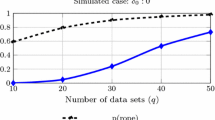Abstract
Statistical learning theory offers an architecture needed for analysing the problem of inference, which includes, gaining knowledge, predictions, decisions or constructing models from a set of data. It is studied in a statistical architecture that is there are assumptions of statistical nature of the underlying phenomena. For predictive analysis, Linear Models are considered. These models tell about the relation between the target and the predictors using a straight line. Each linear model algorithm encodes specific knowledge, and works best when this assumption is satisfied by the problem to which it is applied. To generalize logistic regression to several classes, one possibility is to proceed in the way described previously for multi-response linear regression by performing logistic regression independently for each class. Unfortunately, the resulting probability estimates will not sum to one. In order to obtain proper probabilities, it is essential to combine the individual models for each class. This produces a joint optimization problem. A simple way is address multiclass problems also known as pair-wise classification. In this study, a classifier is derived for every pair of classes using only the instances from these two classes. The output on an unknown test example which is based on the class which receives maximum votes. This method has produced accurate results in terms of classification error. It is further used to produce probability estimates by applying a method called pair-wise coupling, which calibrates the individual probability estimates from the different classifiers.
Access this chapter
Tax calculation will be finalised at checkout
Purchases are for personal use only
Similar content being viewed by others
References
Frank, E., Hall, M.A., Witten, I.H.: The WEKA Workbench. Online Appendix for “Data Mining: Practical Machine Learning Tools and Techniques”, 4th edn. Morgan Kaufmann (2016)
Edwards, J.: Differential Calculus for Beginners (2016). ISBN: 9789350942468, 9350942461
Jain, K., Manghirmalani, P., Dongardive, J., Abraham, S.: Computational diagnosis of learning disability. Int. J. Recent Trends Eng. 2(3), 64 (2009)
Jain, K., Mishra, P.M., Kulkarni, S.: A neuro-fuzzy approach to diagnose and classify learning disability. In: Proceedings of the Second International Conference on Soft Computing for Problem Solving (SocProS 2012), 28–30 Dec 2012. Advances in Intelligent Systems and Computing, vol. 236. Springer (2014)
Manghirmalani, P., Panthaky, Z., Jain, K.: Learning disability diagnosis and classification—a soft computing approach. In: World Congress on Information and Communication Technologies, pp. 479–484 (2011). https://doi.org/10.1109/WICT.2011.6141292
Manghirmalani, P., More, D., Jain, K.: A fuzzy approach to classify learning disability. Int. J. Adv. Res. Artif. Intell. 1(2), 1–7 (2012)
Mishra, P.M., Kulkarni, S.: Classification of data using semi-supervised learning (a learning disability case study). Int. J. Comput. Eng. Technol. (IJCET) 4(4), 432–440 (2013)
Manghirmalani Mishra, P., Kulkarni, S.: Developing prognosis tools to identify LD in children using machine learning techniques. In: National Conference on Spectrum of Research Perspectives (2014). ISBN: 978-93-83292-69-1
Manghirmalani Mishra, P., Kulkarni, S., Magre, S.: A computational based study for diagnosing LD amongst primary students. In: National Conference on Revisiting Teacher Education (2015). ISBN: 97-81-922534
Mishra, P.M., Kulkarni, S.: Attribute reduction to enhance classifier’s performance-a LD case study. J. Appl. Res. 767–770 (2017)
Rolewicz, S.: Metric Linear Spaces. Monografie Mat. 56. PWN–Polish Sci. Publ., Warszawa (1972)
Tibshirani, R.: Regression shrinkage and selection via the lasso. J. R. Stat. Soc., Ser. B 58(1), 267–288 (1996)
Yan, X., Su, X.G.: Linear Regression Analysis: Theory and Computing (2009). ISBN: 13:978-981-283-410-2
Author information
Authors and Affiliations
Corresponding author
Editor information
Editors and Affiliations
Rights and permissions
Copyright information
© 2023 The Author(s), under exclusive license to Springer Nature Switzerland AG
About this paper
Cite this paper
Mishra, P.M., Kulkarni, S. (2023). Analyzing and Augmenting the Linear Classification Models. In: Abraham, A., Hong, TP., Kotecha, K., Ma, K., Manghirmalani Mishra, P., Gandhi, N. (eds) Hybrid Intelligent Systems. HIS 2022. Lecture Notes in Networks and Systems, vol 647. Springer, Cham. https://doi.org/10.1007/978-3-031-27409-1_43
Download citation
DOI: https://doi.org/10.1007/978-3-031-27409-1_43
Published:
Publisher Name: Springer, Cham
Print ISBN: 978-3-031-27408-4
Online ISBN: 978-3-031-27409-1
eBook Packages: Intelligent Technologies and RoboticsIntelligent Technologies and Robotics (R0)




